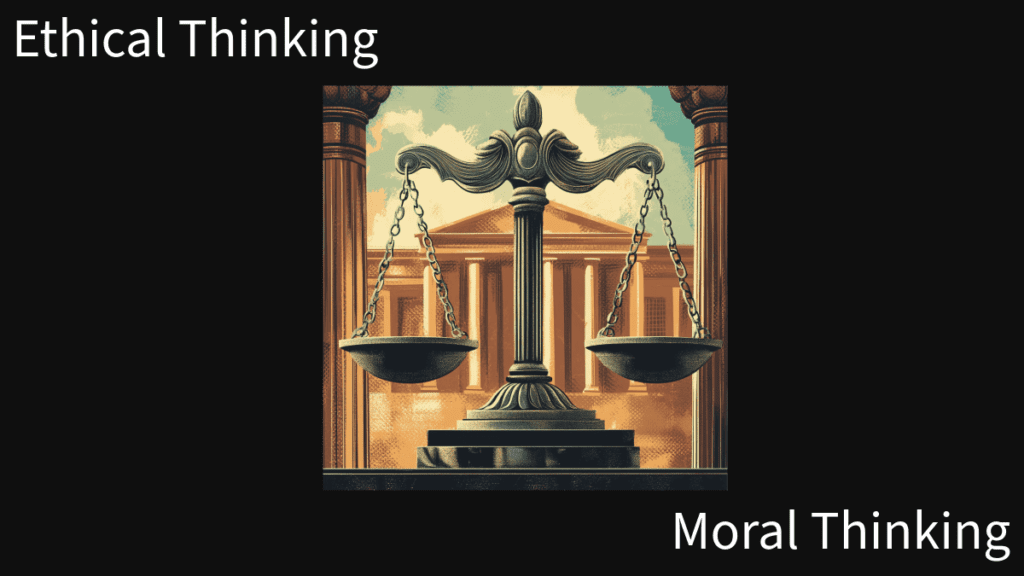Ethical Thinking Over Moral Thinking: Instilling Balance and Predictability in Security Outcomes
In the fast-evolving landscape of cybersecurity, a shift from conventional moral thinking to structured ethical considerations is essential. While the development of moral reasoning or judgments are often subjective and rooted in personal beliefs, ethical thinking in cybersecurity emphasizes clear, consistent principles that guide decision-making and predict outcomes. This approach ensures that security professionals can navigate complex challenges with a balanced and rational framework based on ethical thinking over moral thinking.

Beyond Personal Morality:
The Limits of Moral Absolutism:
Moral thinking, while important, can sometimes lead to decisions based solely on personal or cultural values without a rigorous assessment of the broader consequences. This subjective approach can result in inconsistent policies that are reactive rather than strategic. By relying on ethical thinking, organizations can establish uniform standards that are both principled and practical.
The Value of Ethical Frameworks:
Ethical thinking is built on frameworks that promote fairness, transparency, and accountability. It requires security professionals to consider the wider impact of their actions—not only on immediate systems but also on society at large. This balanced perspective helps create predictable outcomes, reducing the risk of unforeseen vulnerabilities and ensuring that security measures align with long-term organizational goals.
Cultivating Ethical Thinking:
Structured Decision-Making:
Ethical thinking encourages the use of well-defined frameworks and models that guide decision-making processes. This involves evaluating potential actions based on their outcomes, consistency with established ethical standards, and the overall benefit to stakeholders. Such an approach minimizes the influence of individual biases and ensures that decisions are both rational and equitable. This is the main reason the cybersecurity field needs to establish ethical thinking over moral thinking throughout its ranks.
Transparency and Accountability:
A commitment to ethical considerations means maintaining transparency in security practices. When actions are guided by clear ethical principles, it becomes easier to hold individuals and organizations accountable for their decisions. This transparency builds trust among stakeholders, fostering an environment where security measures are not only effective but also justifiable to all parties involved.
Balancing Innovation with Responsibility:
The rapid pace of technological change demands that security professionals innovate continuously. However, innovation must be balanced with responsibility. Ethical thinking helps ensure that new solutions are not only effective but also ethically sound, preventing the introduction of unintended risks or societal harms. This balance is critical in an era where emerging technologies, such as AI, have the potential to both protect and endanger.
Real-World Impact:
Consistency in Policy Implementation:
By prioritizing ethical thinking, organizations can develop and enforce security policies that are consistent and predictable. This uniformity reduces confusion during crises, ensuring that responses are aligned with both strategic goals and ethical standards.
Predictability and Stability:
Ethical frameworks provide a stable foundation for decision-making, which is crucial in environments where security threats evolve rapidly. This predictability allows organizations to anticipate outcomes and plan accordingly, reducing the likelihood of unexpected breaches or failures.
Conclusion: Ethics vs Moral Reasoning
In summary, shifting from moral to ethical thinking in cybersecurity is not about abandoning personal values—it’s about adopting a disciplined, structured approach that yields reliable and equitable outcomes. By fostering an environment where decisions are made based on clear ethical frameworks, security professionals can ensure that their actions are balanced, transparent, and ultimately more effective in mitigating risks. Establishing these standards then enables others the ability to start assessing ethical thinking to ensure right or wrong considerations are withheld to the same standards across cyberspace. This shift from ethical thinking over moral thinking is key to building a resilient, accountable cybersecurity posture in an increasingly complex digital world.





